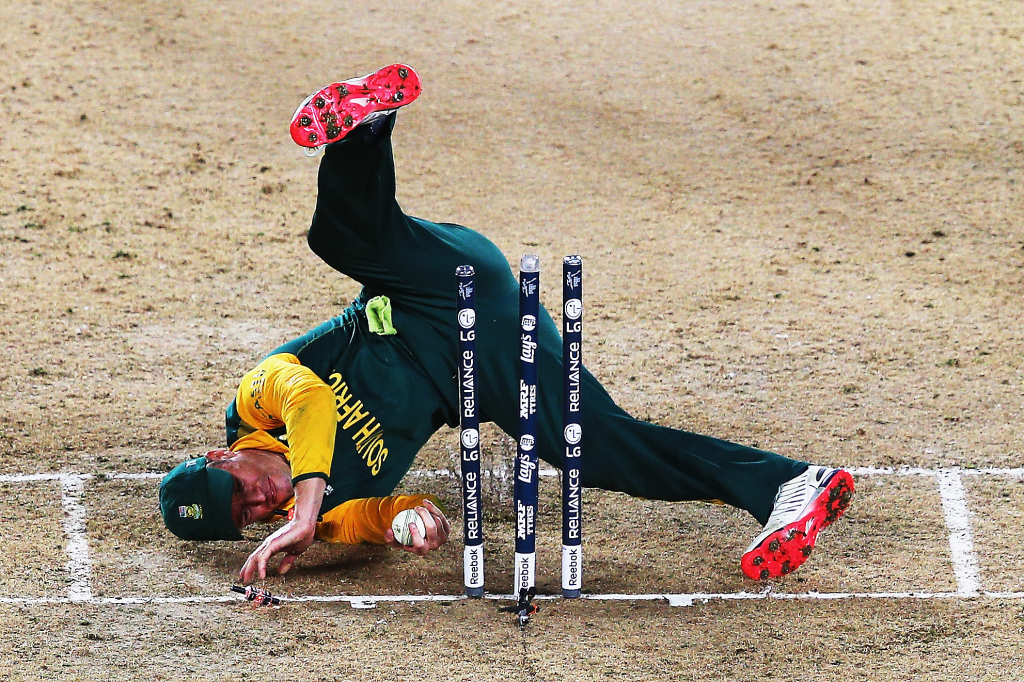Until South Africa learn how to perform under pressure, they will never win a World Cup in any format.
Bring out the scalpel, it’s time for another autopsy to try and found out why South Africa have failed at another ICC event.
This time, South Africa have no one but themselves to blame for their shortcomings.
Unlike the 2015 World Cup in Australia, fingers can’t be pointed at a rain interruption which affected a crucial game. Or political interference in team selections. This one is all their own fault.
It’s easy to fall into the trap of thinking this is a complicated issue. After all, if it wasn’t it would have been fixed a long time ago. But it isn’t and it hasn’t.
I believe it all boils down to this: South Africa’s players have an inability to perform under pressure. They can’t take the heat. It comes down to a mental problem which rears its ugly head in those big moments.
It’s a recurring theme for the Proteas. It’s like they’re stuck in an infinite loop of poor decisions which results in heartache every time. Even in that semi-final against New Zealand in the 50-over World Cup, despite the rain and despite having to play with Vernon Philander instead of Kyle Abbott, they still had chances to win that game.
They dropped a catch and missed a run-out, maybe even two (my memory refuses to remember such traumatic events), which would have won them that game and taken them to their first ever World Cup final. Instead it ended in heartbreak and a political cover-up of note.
Make no mistake, many, if not most of the players who played in that game took a mental knock after that result. The manner of defeat was difficult to accept, because as AB de Villiers said after the game they ‘left everything out on the field’.
This time they couldn’t even make the play-offs of an unpredictable tournament for which they picked an exceptionally talented squad.
It didn’t work out. They bombed and now we have to once again ask ourselves why?
Folding under pressure is the biggest reason. Another reason is the fact that the skill level of the bowlers specifically was neither good enough nor up to standard.
We like to blame coaches and politicians for results like these, but in the end it is the players who have to do it on the field. They have to execute the game plan. Why are we blaming bowling coach Charl Langeveldt? Yes, perhaps the bowling plans weren’t right but is it solely his responsibility to come up with that? I don’t think so.
Did he bowl the 20 wides South Africa conceded in the defeat to England? No, he did not. Chris Morris did. As did Dale Steyn, Kagiso Rabada and Kyle Abbott. No one blames a football manager when a player misses a penalty. Or fluffs an open shot at goal.
Or when a flyhalf misses a penalty or conversion. So why do we want to blame a bowling coach when the bowlers bowl crap?
Another reason for South Africa’s downfall is their lack of trust in spin bowling, especially on the subcontinent. Looking back, perhaps Aaron Phangiso should have played in more than two games. Everyone else had two decent spinners. Why did we never consider opening the bowling with a spinner? We did it at the 2011 World Cup, also played in India, with Robin Peterson and it worked. Maybe Faf du Plessis did consider it. Who knows.
Maybe we should have settled on a batting position for AB de Villiers, our best batsman on paper and who Du Plessis was convinced was best suited to opening the batting in Indian conditions. Until they arrived there and that thought process was thrown out of the window.
In a must-win game against the West Indies, we relied on a 20-year-old to lead our bowling attack. Yes, Kagiso Rabada is one of our best bowlers but is he really that much better a T20 bowler than Kyle Abbott? I don’t think so.
In the end, despite all this, South Africa still failed to defend 229 against England. They also failed to adapt to the conditions in Nagpur, got out cheaply and couldn’t defend a below-par total against the West Indies.
Sport, when you’re successful, is about executing under pressure. The other teams have always done that better than us.
It seems South Africa can only perform when there is nothing to play for. When the pressure is off. How do we fix that mentality? I don’t know.
Worryingly, neither do they.







